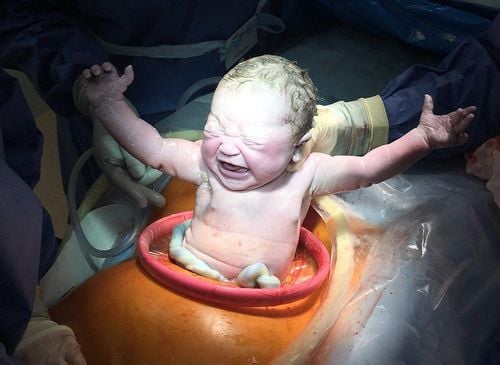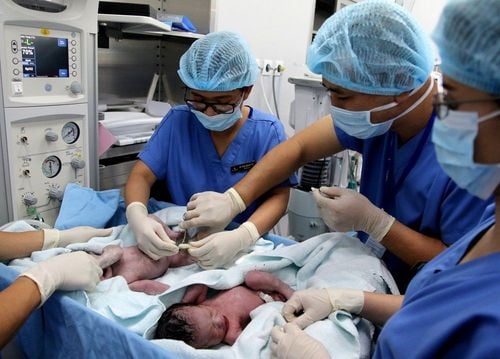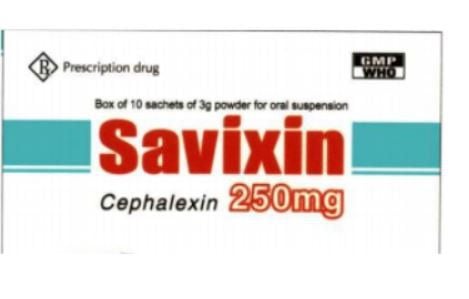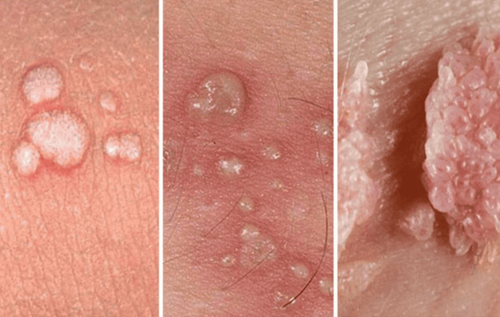This is an automatically translated article.
The article is professionally consulted by Master. Doctor Nguyen Thi Nhat - Doctor of Infectious Diseases, Department of Medical Examination & Internal Medicine - Vinmec Hai Phong International General Hospital.The Department of Preventive Medicine, Ministry of Health recently said that the hepatitis B virus infection rate in Vietnam is about 10-20% of the population, especially in pregnant women and children. Children who transmit hepatitis B virus from their mothers can develop cirrhosis and liver cancer in the future. The following article will help mothers answer the question of when and how the hepatitis B virus is transmitted from mother to child.
1. Transmission routes of Hepatitis B Virus
Hepatitis B is caused by the hepatitis B virus (HBV) that attacks and damages the liver. Most infected adults can get rid of the hepatitis B virus easily. However, some adults, including pregnant mothers and most infected infants and young children, are unable to clear the virus.Hepatitis B is 100 times more infectious than HIV. According to the National Institute of Hygiene and Epidemiology, hepatitis B virus can be transmitted in the following ways:
Vertical transmission is mother-to-child transmission: Most occurs during the perinatal period (from the second week of life). 28 of pregnancy to the 7th day postpartum) or the first months postpartum, there is no placental transmission, which is the most common and important mode of infection. Horizontal transmission by contact: Transmission usually occurs in homes, children's hospitals, schools and daycares ..... may involve contact with minor skin wounds or abrasions. , mucosa with bleeding, or exudate from the wound. Hepatitis B virus can also be transmitted by contact with saliva through bites, other scratches on the skin as well as chewing food before giving to a child. Transmission through injection and blood transfusion: Unsafe injections are the main route of transmission of hepatitis B virus and other diseases (hepatitis C, HIV) in many countries. Transmission during sex: When there is abrasion, contact with blood or other body fluids. Among the above transmission routes, children are mainly infected with hepatitis B virus from mother to child.
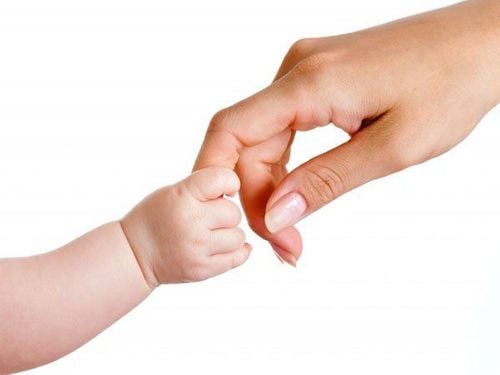
2. When and how is the hepatitis B virus transmitted from mother to child?
Hepatitis B virus can be transmitted from mother to baby at the following times: During pregnancy, during labor and during breastfeeding.2.1 During pregnancy
The rate of hepatitis B transmission from mother to child during pregnancy does not exceed 2%.
Normally, the blood of the pregnant mother and the fetus does not come into contact with each other, but is separated by a placental barrier, where nutrients are exchanged. In early pregnancy, the placental barrier consists of 4 layers (blood capillary endothelium, connective tissue, trophoblast and syncytial trophoblast) but in the post-pregnancy period (after the 4th month) the trophoblast The cytoplasm disappears, the syncytial trophoblast becomes very thin, and the connective tissue is significantly reduced. The placental barrier becomes very fragile. Therefore, just a slight concussion damages the placental barrier, the mother's blood will come into contact with the fetal blood to transmit hepatitis B virus.
2.2 During labor and delivery
Up to 90% of mother-to-child transmission of hepatitis B virus occurs during this period.
When the uterine muscles contract, the blood vessels where the placenta attaches are also constricted, which can cause the mother's blood to come into direct contact with the baby's blood or when the baby passes through the mother's vaginal canal, the baby comes into contact with vaginal fluids, transmission will take place at this point.
If the mother is infected with HBV and has HBeAg (+), the infant has a 95% chance of becoming infected if not receiving immunoprophylaxis. In case the mother is infected with HBV but HBeAg (-), the infection rate to the baby is 32%.
2.3 Lactation period
It is extremely rare for infants to become infected with hepatitis B virus while breastfeeding. Although HBV DNA has been detected in colostrum of HBsAg-positive mothers, the concentration is very low, so the possibility of infection through these fluids is also very low.Infections during this period can be caused by problems with the mother's nipples, the baby's mouth, and the serum containing the hepatitis B virus coming into contact with the baby's blood when the baby is suckling directly. Therefore, mothers with chronic hepatitis B who are breastfeeding need to practice care to prevent bleeding from cracked nipples by feeding their babies properly and by keeping the nipples clean before and after the baby feeds.
3. Prevention of Hepatitis B transmission from mother to child
Should not be pregnant during acute hepatitis: For patients with chronic diseases, it is recommended to monitor liver function periodically for a long time and always listen to the doctor's advice about taking medicine to treat the disease if you want to have a baby. child. The active virus phase should not be pregnant, when liver function returns to normal, HBeAg negative should be pregnant.Vaccinate Children with Hepatitis B Vaccine According to the World Health Organization and the National Expanded Immunization Program, the safest and most effective way to prevent hepatitis B virus infection is through vaccination. hepatitis B vaccine.
The sooner the hepatitis B vaccine is given, the more effective it is. Within 12-24 hours after birth, the vaccine can prevent 85-90% of cases of mother-to-child transmission, this is a competition between the replication of the Hepatitis B virus and the neutralizing antibodies. are in the body. The preventive effect will decrease gradually with each day and is not reached if the injection is given after 7 days. Early vaccination against hepatitis B not only prevents mother-to-child transmission, but also helps children to be protected early by other family members.
Vaccination is the most effective and safest way to prevent hepatitis B (WHO)
In addition to early vaccination with 1 dose of hepatitis B vaccine to create active immunity, children of HBsAg-positive mothers also need to be vaccinated. 01 dose of Hepatitis B Immune Globulin (HBIG) is a passive immunity that helps neutralize the hepatitis B virus while waiting for the effects of the vaccine. Two injections at two different sites within 12-24 hours postpartum
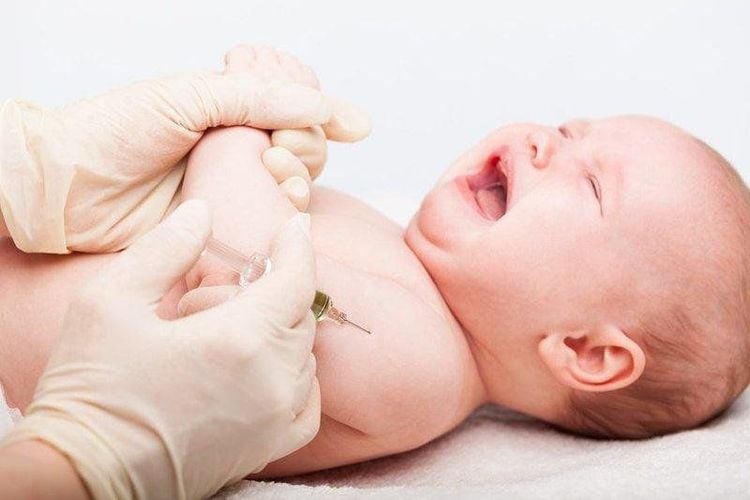
Breastfeeding immediately after birth WHO recommends breast milk as the best food for the development of infants and young children. The results of a WHO study published in 2009 confirmed that there is no evidence that breastfeeding increases the risk of hepatitis B infection from breastfeeding mothers and that breastfeeding does not pose a higher risk of infection compared with breastfeeding. infants are not breastfed and are insignificant compared to the higher risk from exposure to maternal blood and body fluids at birth.
Mothers infected with hepatitis B virus should avoid direct breastfeeding
To minimize the transmission of Hepatitis B Virus from mother to child, mothers should regularly monitor their health status, choose the time of conception be appropriate, comply with the WHO vaccination regimen and the National Expanded Immunization Program to keep your children healthy.
4. Where was the Hepatitis B virus detected?
When registering for the program "PREPARATION PACKAGE" at Vinmec General Hospital, the mother will be examined and tested for prenatal care, during childbirth and after birth, in case the pregnant mother is found to be infected with the virus. Hepatitis B, mother and baby will be monitored and consulted by doctors during pregnancy, antibody tests to assess what stage hepatitis is in, from which to have treatment.With a team of highly qualified obstetricians and gynecologists, modern medical techniques, when choosing a maternity package at Vinmec, mothers will be comprehensively monitored from pregnancy to childbirth. and postpartum, making childbirth more comfortable and gentle
Please dial HOTLINE for more information or register for an appointment HERE. Download MyVinmec app to make appointments faster and to manage your bookings easily.





